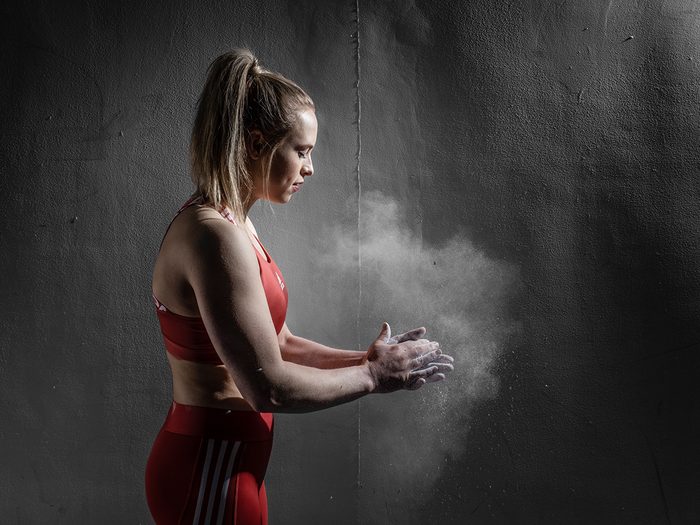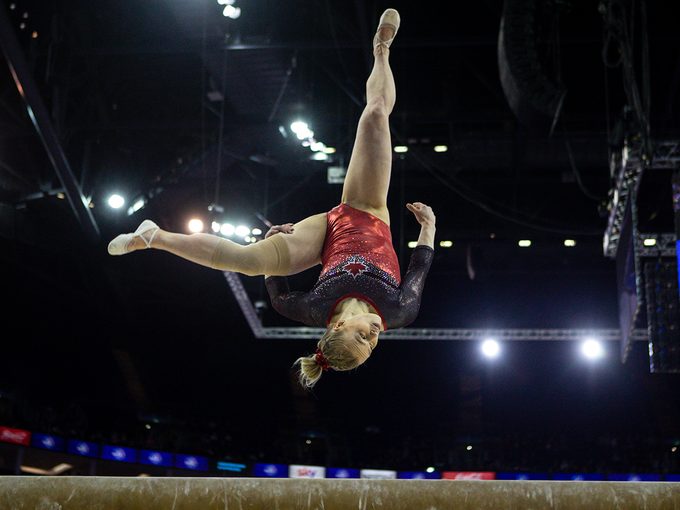How Canadian Ellie Black Prepared for the 2021 Olympics, Despite the Pandemic

The Canadian Olympian shares how she stayed physically and mentally healthy during the pandemic, and how she’s feeling about the 2021 Olympic Games.
Last year, gymnast Ellie Black’s race towards the 2020 Olympic Summer Games took an unexpected—albeit necessary—turn.
On March 22, 2020, the Canadian Olympic Committee (COC) and Canadian Paralympic Committee (CPC) announced Team Canada would not send athletes to the Summer Games, set to take place on July 24 that year. Canada was the first country to withdraw from the 2020 Games amid growing concerns about COVID-19. Two days later, the International Olympic Committee (IOC) announced the Summer Games would be officially postponed until 2021.
Rather than feeling disappointed, Black mentally reframed the deferral as an advantage. “I was upset, and it took me a few weeks for [the news] to actually sink in, but there was a silver lining for me,” she says. “I hurt myself at the World Championships and had to have major surgery in the fall of 2019, so the Olympics being delayed gave me more time to recover, get strong for my team, and get my skills back.”
This will be the Halifax-native’s third time competing at the Summer Olympics. At the 2016 Rio Olympics, Black finished fifth in the women’s individual all-around, the highest standing ever achieved by a Canadian gymnast in the event. Now, at 25, she’s older than most other elite gymnasts, but Black says she has managed to continue competing by taking good care of her body and allowing herself to rest and recover properly.
But when COVID-19 hit, and shifting public-health guidance and lockdown orders came into place, her training and self-care regimen had to be reconfigured.
Black’s gym closed in March 2020, which meant she had to get creative with how and where she could train. “I was primarily training from home, which is hard for a gymnast since I couldn’t actually practice my skills, like on the swinging bars—you can’t simulate that outside of the gym,” says Black. She concentrated on staying fit and strong, and found new ways to do so, like virtual yoga classes with her teammates.
Black’s home province of Nova Scotia relaxed restrictions last June, so after three months of at-home workouts, the Olympian started working to build back her pre-lockdown skill level.
With the rescheduled Olympics Games in Tokyo due to begin July 21, we caught up with Black to find out how she’s stayed physically and mentally healthy during the pandemic, how she feels about current COVID-19 concerns surrounding the Olympics and what she hopes to do after competing on the largest stage in the world.
(Related: How Canadian Olympian Phylicia George Trains in Quarantine)

What drew you to gymnastics, and what made you want to compete?
I started competing in gymnastics when I was nine. So, almost 19 years now. When I found gymnastics, it just kind of clicked. I get to push myself every day and see what I can achieve, and there’s always so much to learn and improve on. David Kikuchi, my current coach and a two-time Olympic gymnast, was training for the Olympics at my club when I was quite young. Having someone from your own club reach that level was so inspiring, it made me want to shoot for competing on the world stage—and, hopefully, represent Canada someday.
What does your training routine look like now as you gear up for the 2021 Olympics?
My day starts around 8 a.m. I get up and prepare my breakfast, which is usually hard-boiled eggs. Nutrition is a really big part of my everyday training routine—I need to fuel my body with the proper foods to be at my best, which means making sure I’m getting nutritious foods and high-quality proteins.
After breakfast, I go train at the Canadian Sports Center Atlantic with my strength and conditioning coach. I do a 60- to 90-minute workout with him, depending on the phase of training we’re in. From there, I transfer from the lifting gym to my gymnastics facility, which is when I can usually take a little break. I may have my typical pre-training and pre-competition meal, which is oatmeal, a hard-boiled egg if I didn’t have one for breakfast, and fruit. It gives me the energy I need to get through a four- to five-hour practice after lifting in the morning.
At practice, we do a warm-up—I do rolling, injury prevention, stretching and mobility exercises, we run the stretching warm-up lines—and then we go to events [i.e. beam, bars, floor and vault], which each range from 20 minutes to 40 minutes. Then, we finish off the training with conditioning and flexibility for 30 minutes to an hour. When I head home in the evening, I make sure I get good recovery work in, within 30 minutes of finishing practice, because that’s the optimal time. I may go to physio, but if I’m at home, I’ll make sure I’m doing leg compressions, having an ice bath, or icing a specific area of my body. Then I have some time to relax.
It’s really important that I’m taking care of my body—resting, recovering, and fuelling properly. I love cooking and baking, going outside to get fresh air and ground myself—that’s a recovery in itself. It’s about finding the little things that make you happy and allow yourself to recover.
What about preparing mentally? How do you handle the pressure of preparing for such big competitions?
It’s about focusing on the things that are in my control. I rely on meditation, breathing exercises, visualization, pilates, listening to music and communicating with those people around me—my team, coach, family, friends, support staff—to stay focused. I also work with a sports psychologist who helps me with my mental performance. We talk about every aspect—the ups, the downs, the preparations, the success, the failures, the different scenarios that could come about and how I’m going to handle those.
During the pandemic, many Canadians have experienced mental health challenges. Did the pandemic impact your mental preparation for the Olympics?
The lockdown has been really tough for everyone. I focus on the things I need to prioritize, like feeling good, to be able to handle the situation. That includes reaching out to my family, coaches, teammates, and vice versa. Having support goes a long way.
Do you have any COVID-related concerns about the Olympics this year?
I’m feeling positive. I know that Canada, Japan and other countries around the world are working towards the Games going on in the safest possible way—we all just need to keep doing our part to keep ourselves and everyone else safe. Our hope is to make sure all the athletes on our team are fully vaccinated before we go.
It’s been a long road to Tokyo 2021, but what are your plans for after the Olympics?
This year, we won’t have the opportunity to celebrate with family and friends in Japan since there will be no spectators at the games—but that celebration is going to happen when we get back home. We will take a little break from training after the Olympics because they’re exhausting. Plus, it’s important to take some time to spend with family and friends—to be able to enjoy that moment and rest physically and mentally. And then slowly get back into it.
This interview has been edited and condensed for clarity.
Next: 12 Things Mental Health Experts Want You to Know About Naomi Osaka’s French Open Withdrawal




